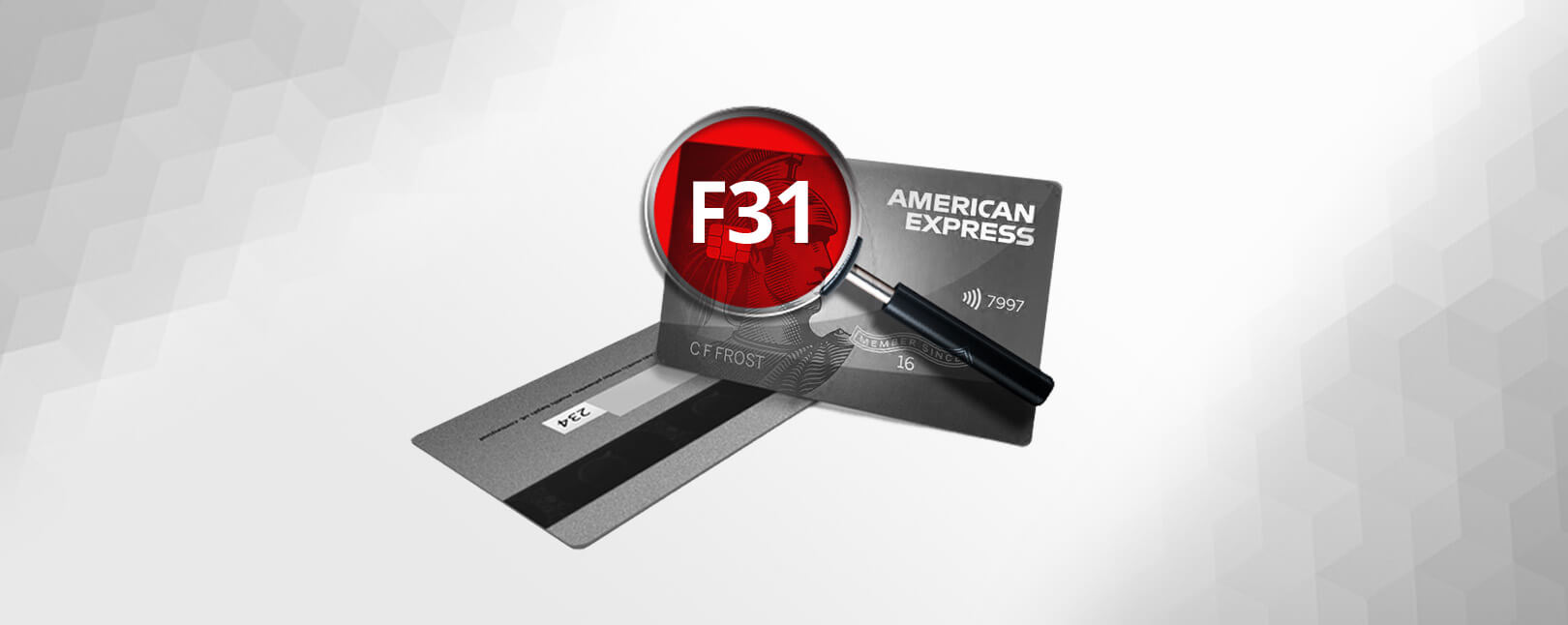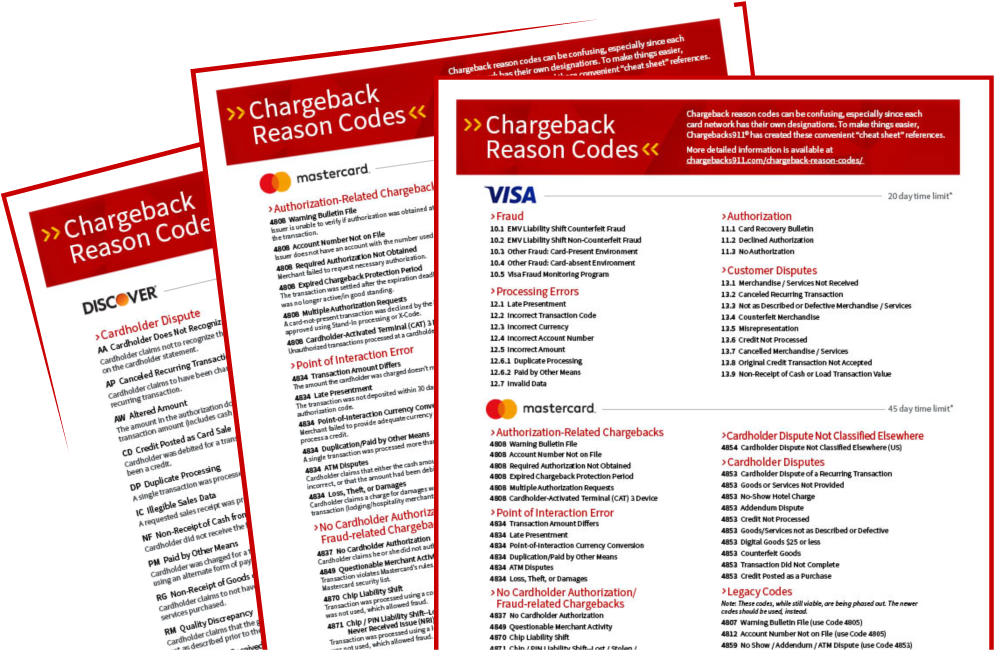
How to Handle Amex Reason Code F31 Chargebacks
American Express breaks down the acceptable causes for a customer to dispute a credit card transaction in their dispute guidelines. This is done for the sake of simplicity and standardization.
Each chargeback trigger has a designated “reason code.” Amex can then assign the appropriate code to each case to show the given reason for the chargeback.
Learn more about Amex reason codes
Today, we’re looking at one reason code in particular — F31 — and exploring the causes, timeframes, fees, and other specifics. We’ll also explore what you can do to prevent these chargebacks from happening.
Recommended reading
- Chargeback Stats: All the Key Dispute Data Points for 2025
- Credit Card Disputes | Step-by-Step Process Guide for 2025
- Mastercard Chargeback Time Limits: The 2025 Guide
- Chargebacks911® Gets in the Game for the Special Olympics!
- Chargebacks911® Food Drive in Support of The Kind Mouse!
- Can You Dispute A Dispute? Yes — Here’s What to Do
What is American Express Reason Code F31?
American Express chargeback reason code F31 is “EMV Lost/Stolen/Non-Received.”
This reason code is used to explain that the cardholder claims to have not authorized the charge. In addition, the cardholder claims that the chip card with PIN capabilities was either lost, stolen, or otherwise not in their possession at the time the purchase happened.
The card was used at a point-of-sale terminal, but the transaction was not processed as a chip card transaction with PIN validation. This might’ve happened because the POS system was not equipped with chip-and-PIN technology, or the transaction was keyed-in manually.
What Caused This Dispute?
Amex Chargeback Reason Code F31 is primarily issued when an EMV-enabled card is used without the cardholder’s permission. To demonstrate, this scenario can arise if:

How to Respond to Amex Reason Code F31 Chargebacks
So, what happens if you can prove that the transaction in question was not a case of EMV fraud?
Addressing the issue promptly is essential upon receiving an Amex F31 chargeback. Should you believe the chargeback was mistakenly issued, you need to initiate a dispute response. This is achieved via a process called representment.
Representment lets you contest the chargeback by presenting evidence to the card issuer (in this case, American Express) that confirms the transaction was valid and adhered to the issuer’s guidelines. This can require submitting various crucial pieces of evidence.
It’s also important to be mindful of the strict timeframe involved. Remember, you have only 20 days to put forward your response to American Express. However, this deadline includes the period taken by your acquirer to inform you of the dispute and their time to review and submit your case. In reality, this often leaves you with five days or less to compile and submit your response.
Acceptable Evidence for Amex Reason Code F31 Responses
You can re-represent these charges under the condition that you have compelling evidence.
For American Express reason code F31 chargebacks, you’ll need to provide evidence that the transaction was conducted as a card-not-present transaction, or documentation that the POS system successfully processed a chip card transaction with PIN verification. Examples of documentation include:
- Cardholder authentication data (AVS, CVV, geolocation, IP address, etc.)
- Records of previous transactions with the cardholder that were not disputed
- Shipping and tracking information
- Transaction receipt, showing the purchase was made at a card-present POS
Alternatively, you might have already issued a credit to the buyer as a way of trying to avoid the dispute. In this case, you’ll need to offer proof that you already provided a credit to offset the amount charged.
The success of representment depends on the thoroughness and relevance of the evidence provided. Maintaining detailed records of transactions and communications with customers is vital to effectively counteract all chargebacks, including those under reason code F31.
How to Prevent Amex Reason Code F31 Chargebacks
As the old adage goes, “an ounce of prevention is worth a pound of cure.”
You may never be able to stop chargebacks entirely. But, you can limit your exposure to risk and keep your chargeback ratio in good standing by adopting a few best practices. Generally speaking, you’ll want to:
#1 | Dip the Chip
Utilize an EMV or chip-enabled POS system whenever feasible. Avoid swiping or manually keying-in cardholder information during a card-present sale unless absolutely necessary.
#2 | Know Your Buyer
Verify customer identification by checking ID for all in-person transactions. This is especially important for high-dollar-value transactions.
#3 | Never Skip Out On Authorization
Get a legitimate authorization code, as well as a card imprint, for any manually entered transactions, or key in the card verification number.
#4 | Get Consent
With a card-not-present sale, be sure to get explicit approval from the cardholder for billing for goods or services. Clarify the terms up front so there’s no misunderstandings.
#5 | Keep Good Records
Keep records that link the cardholder’s consent to the billing details and terms for the goods or services purchased.
Take a Wider View
You can dispute invalid chargebacks from Amex reason code F31. However, it’s much more efficient to take a proactive stance. The same is true of the other chargeback reason codes, as well. A truly effective chargeback management strategy must encompass prevention as well as disputing cases of friendly fraud.
Chargebacks911® can help your business manage all aspects of chargeback reason codes, with proprietary technologies and experience-based expertise. Contact us today for a free ROI analysis to learn how much more you could save.
FAQs
Does Amex investigate chargebacks?
Yes. American Express investigates chargebacks by reviewing the evidence provided by both the merchant and the cardholder to determine the legitimacy of the transaction and decide on the chargeback claim. This process ensures a fair resolution based on the documentation and arguments presented by both parties.
What is the reason code for a chargeback on American Express card?
An American Express chargeback reason code is a code that identifies the specific reason a cardholder or issuing bank has disputed a transaction, guiding the merchant on the nature of the dispute and what evidence may be required to contest it. Each code corresponds to a particular issue, such as unauthorized use, processing errors, or non-receipt of goods or services. Click here to see a full list of Amex reason codes.
Do police investigate chargebacks?
Police typically do not investigate chargebacks as they are considered a dispute between the merchant and the cardholder, handled through the card issuer's internal processes. However, if fraud is suspected as the cause of a chargeback, law enforcement may be involved in investigating the fraudulent activities.
How successful are Amex disputes?
The success of an American Express dispute depends on the merchant's ability to provide compelling evidence that the transaction was valid and in accordance with Amex policies. Success rates vary widely based on the nature of the dispute and the quality of the documentation provided by the merchant.
How does American Express investigate disputes?
American Express investigates disputes by reviewing documentation and evidence provided by both the cardholder and the merchant, such as transaction receipts, proof of delivery, or communication records, to determine the validity of the chargeback claim. This process aims to ensure a fair resolution based on the facts presented by both parties.









